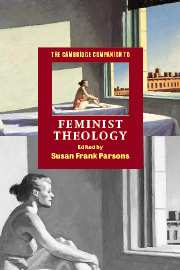Book contents
- Frontmatter
- Part one The shape of feminist theology
- 1 The emergence of Christian feminist theology
- 2 Feminist theology as intercultural discourse
- 3 Feminist theology as philosophy of religion
- 4 Feminist theology as theology of religions
- 5 Feminist theology as post-traditional thealogy
- 6 Feminist theology as biblical hermeneutics
- 7 Feminist theology as dogmatic theology
- Part two The themes of feminist theology
- Index
2 - Feminist theology as intercultural discourse
from Part one - The shape of feminist theology
Published online by Cambridge University Press: 28 May 2006
- Frontmatter
- Part one The shape of feminist theology
- 1 The emergence of Christian feminist theology
- 2 Feminist theology as intercultural discourse
- 3 Feminist theology as philosophy of religion
- 4 Feminist theology as theology of religions
- 5 Feminist theology as post-traditional thealogy
- 6 Feminist theology as biblical hermeneutics
- 7 Feminist theology as dogmatic theology
- Part two The themes of feminist theology
- Index
Summary
Feminist theology has become a global movement as women with different histories and cultures challenge patriarchal teachings and practices of the church and articulate their faith and understanding of God. Feminist theology is no more defined by the interests of middle-class European and American women and by Eurocentric frameworks and mind-set. Its scope has been much broadened to encompass the theological voices of women from the ThirdWorld and from minority communities in the United States. These newer theological partners have created new names for their theological movements, utilised new resources as theological data, challenged established norms of interpretation, and raised significant questions about the production of theological knowledge.
This chapter considers the ways in which feminist theology has been challenged by the emerging awareness of cultural diversity among women, and has creatively forged new insights in the midst of intercultural critique, dialogue, and partnership. Culture is defined by Mercy Amba Oduyoye of Ghana as ‘a people’s world-view, way of life, values, philosophy of life, the psychology that governs behaviour, their sociology and social arrangements, all that they have carved and cultured out of their environment to differentiate their style of life from other peoples’.
- Type
- Chapter
- Information
- The Cambridge Companion to Feminist Theology , pp. 23 - 39Publisher: Cambridge University PressPrint publication year: 2002
- 5
- Cited by

